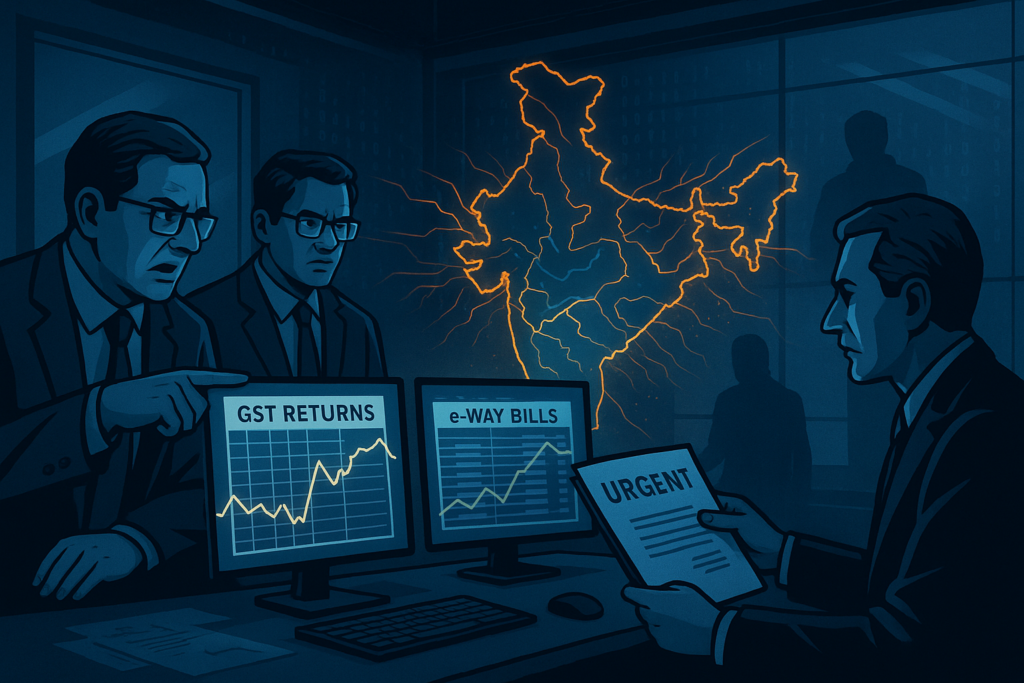In what could be one of the most significant tax data breaches in recent memory, a large-scale operation involving the illicit sale of Goods and Services Tax (GST) data belonging to thousands of Indian traders has come to light. The revelations have raised pressing questions about the integrity of India’s tax data infrastructure and the systemic vulnerabilities within it.
The breach, unearthed by whistleblowers and supported by a leaked WhatsApp exchange, points to a shadowy network allegedly operating out of Delhi, Ghaziabad, and Noida. Entities masquerading as data service providers were reportedly selling sensitive information such as GSTR-1, GSTR-2B, GSTR-3B returns, and e-Way Bill details to third parties.
According to the Surat branch of the Chartered Accountants Association (CAAS), the data was being offered in ‘packages’ priced between ₹5,000 and ₹25,000, with options extending up to six months. The association has now written to Union Finance Minister Nirmala Sitharaman, urging swift intervention and a full-scale investigation into the breach.
“The sale of this sensitive financial data not only violates basic privacy rights but also disrupts market fairness,” said CAAS President Hardik Kakadia. “It’s a direct threat to honest businesses and the credibility of the GST regime itself.”
A Black Market for Tax Data
Evidence reviewed by CAAS suggests that unauthorized actors have been offering confidential tax records—typically available only through secure access—to unknown clients via encrypted messaging platforms. One such conversation revealed offers for “normal domestic data” and add-on packages including e-Way Bill details, a key indicator of the movement of goods.
Experts say that the data, if authentic, could be used to undercut traders, manipulate pricing, and give unfair market advantage to competitors. There are also concerns that it may be leveraged for phishing scams, identity fraud, and broader financial crime.
The incident has stirred debate among tax professionals, digital privacy advocates, and business owners alike, many of whom are demanding greater accountability from government departments responsible for data handling.
Government Silence, Industry Outcry
As of now, there has been no official response from the Ministry of Finance or GSTN (Goods and Services Tax Network), the IT backbone of India’s GST framework. CAAS has stressed the need for an immediate audit of GSTN’s data security protocols and enforcement of stricter access control mechanisms.
“A leak of this scale cannot happen without structural flaws in the system,” said a cybersecurity expert familiar with GST infrastructure. “Either there’s internal compromise or gross negligence in access controls.”
The association has called on the Finance Ministry to publicly commit to transparency in the probe and take strict punitive measures against those found guilty of commercializing taxpayer data.
With trust in digital tax governance hanging in the balance, the incident has amplified calls for a comprehensive data protection law that extends safeguards to government-held financial records as well.
What’s at Stake
The breach comes at a time when India is aggressively pushing digitization of its financial systems. From income tax filings to GST submissions, more businesses than ever rely on government portals to manage compliance. But with convenience comes vulnerability.
In the absence of legal recognition of data breaches involving state systems, experts argue that enforcement remains weak and penalties uncertain.
The Surat CA Association’s demand signals a growing unease within the professional community — one that believes India’s leap into digital tax compliance must be matched with airtight data governance.


